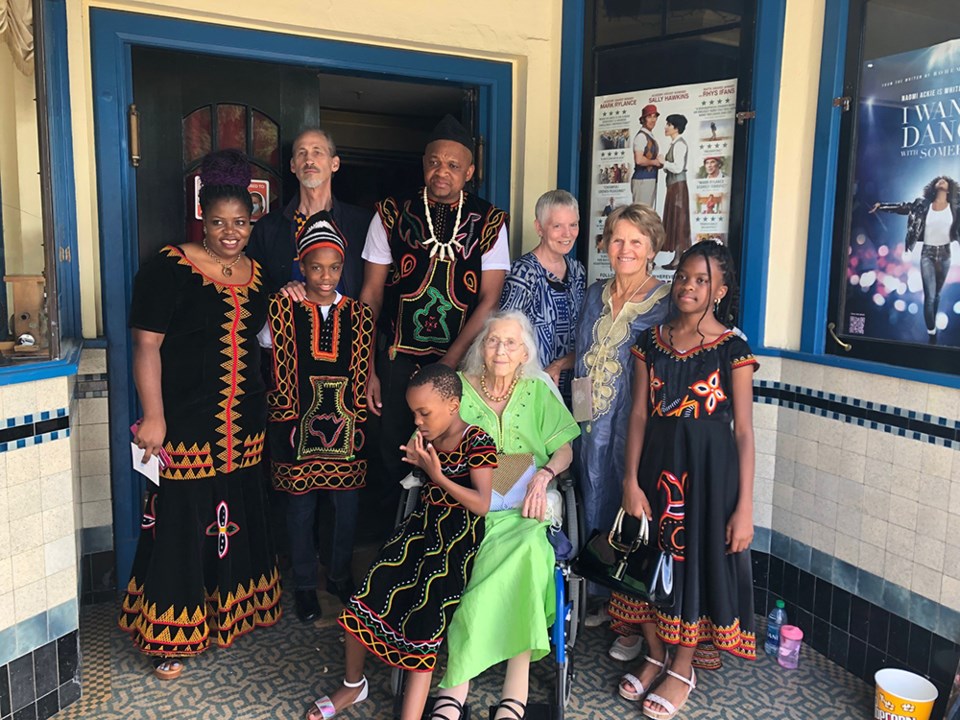A man whose life was changed by former qathet region resident Gerri Graber, Bartholomew Mokuh Njizokokeh, came to the qathet region on August 13 to connect with the community that had such a huge impact on his life.
A former nun, Graber moved to this community to be close to her sister Gina Devlin, who was also in attendance for an event at the Patricia Theatre along with filmmakers Mo Simpson and Jan Padgett.
The two women travelled to Manda in Chad, Africa, to make the documentary, From Under the Bushy Trees, that was first shown years ago at Powell River Film Festival. It was shown again on Saturday.
Graber formed Willing Hearts International and touched the hearts of so many people who provided money for her to see her vision of educating young boys and girls in Africa. She did more than raise funds for a school and economic development, she helped to train teachers and worked to ensure that girls had equal opportunity to attend school.
Njizokokeh, who Gerri adopted as “a son of her heart” and helped attain a university education, now lives and works in Maryland, USA. He keeps in touch with people in Manda, including seven orphans who Gerri and he adopted. He gave an update on them as well as the school, which is still operating after 15 years.
His wife Vivian and their children Gerigraber, Chokwei and Neh accompanied him and were introduced to the audience members.
“It was very emotional to see Gerri, who died more than a decade ago, up on the big screen, and meet Mokuh,” said Joyce Carlson, a member of the Rotary Club of Powell River and Brooks Interact liaison. “We had heard so much about him and how he assisted Gerri to ensure all the funds from here went to their stated purpose. He told me he remembered the stories of Interact students.”
Interact members, two of whom were in the documentary collecting pop cans at the school, raised $6,000 to have two community wells dug in Chad.
“When I watched the water being pumped from a well in the film, I was proud to have been part of the group that provided funding for it,” said Carlson.
She added that a major source of funding was a 24-Hour Famine that was held for several years in a row at Brooks Secondary School.
“Interactors as well as other students would fill sheets with pledges for going without eating. Our Rotary club members acted as chaperones through the 24 hours, staying awake all night. When the famine was over, we brought in pizzas which were quickly devoured.”
She recalled that a village chief was so appreciative of the efforts of the Interactors that he wanted to send a chicken to them as a thank-you gift.
“Gerri told him that she could not take a dead chicken back to Powell River on the plane but promised to buy a chicken when she returned and make soup for the students,” said Carlson. “She kept her promise and took photos to show the chief that she did.”
During the documentary, Rotarians were shown collecting items from Max Cameron Secondary School, which was being demolished at the time. They were to be put in a container and shipped to the school in Manda. In spite of many hours of efforts by many people, the container never was shipped to Chad, which is a landlocked country in the heart of Africa with no access to the sea, rail lines or adequate roads.
“In answer to a question from a member of the audience, I was happy that Mokuh explained that the container was eventually shipped by our Rotary club to a school in Nepal,” added Carlson. “Logistics in getting it to Chad were just too numerous to overcome.”
When people think a problem is so big that there is nothing they can do about it, they only need to heed the story of Graber and how one woman made such a difference in so many lives, Njizokokeh said to attendees.
A recent article contains more information about Graber and Njizokokeh.



